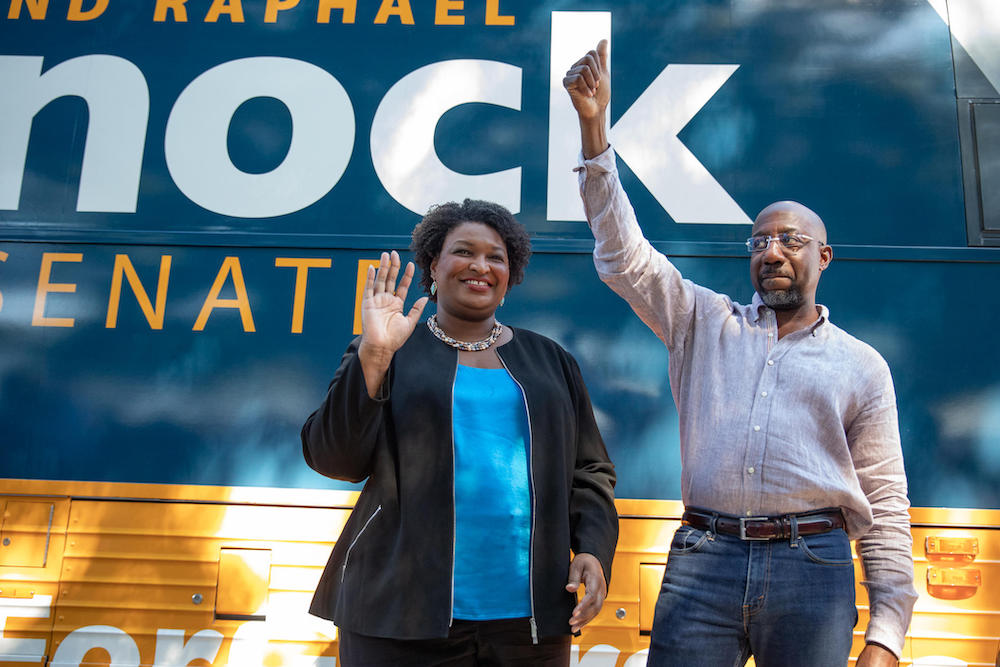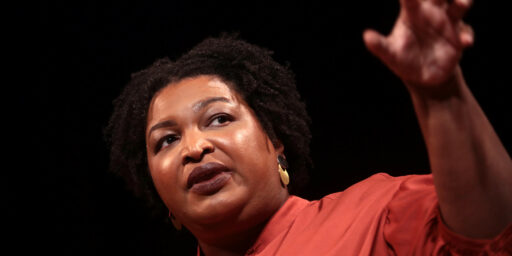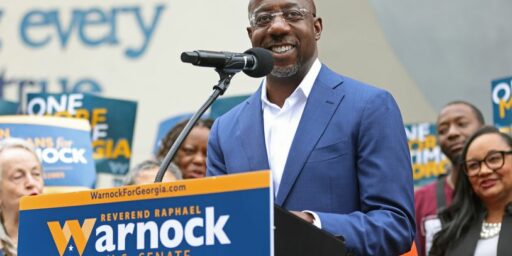What Now for Stacey Abrams’ Model?
Her emphasis on turnout has helped other Democrats but she's a two-time loser.

WaPo’s Cleve R. Wootson Jr. wonders “Does Stacey Abrams’s model for engaging voters die with her election loss?” It’s a weird question that doesn’t become less so with his reporting.
As her star rose over the past four years, Abrams had been hailed as a savior of the Democratic Party who unlocked ways to turn irregular, unmotivated voters into reliable ones, something many believe is key to breaking the stranglehold that Republicans have had on elections in the South and other deeply red places.
Her decade-and-a-half effort has borne fruit in dramatic fashion in the past two years, giving Georgia’s electoral votes to a Democratic presidential candidate for the first time in two decades, then sending two Democrats to the U.S. Senate — including Warnock, twice.
Abrams absolutely deserves credit for her efforts to register and mobilize Democratic voters, particularly in the historically low-turnout Black community. But she’s hardly solely responsible for Warnock’s victories. Not only is he an extraordinarily appealing candidate but he was aided tremendously in both instances by Donald Trump. He almost certainly wouldn’t have won the 2020-21 special election absent Trump’s scorched earth campaign against election integrity, which not only motivated Democrats but depressed the Republican vote. Similarly, Warnock would almost have surely lost his re-election bid against even a nominally non-moronic Republican candidate.
Abrams’s ascension paralleled an unprecedented influx of attention and funding to what her supporters see as the best way to engage reluctant voters, said more than a dozen activists, strategists and organizers interviewed for this story. But her defeat is instant ammunition for those who would direct their energy and money to other strategies.
That Abrams is an effective organizer doesn’t mean that she’s an appealing candidate for Governor. Let alone in a staunchly Republican state. Why would her loss to a popular Republican governor make people question the effectiveness of a turnout strategy?
Abrams has not said what her next step will be, but many are equally concerned with what they see as a bigger question: What becomes of her vision?
“That exact question is the single most important question and debate and struggle within the Democratic Party for the next four to six years,” said Steve Phillips, a political activist and the founder of Democracy in Color, a multimedia platform on race and politics. “I think for those of us who subscribe to [her] view, the climb is a little steeper now because Stacey didn’t win. … There’s still too much conclusion that, you know, it’s all about moderating your views or winning over White moderates and that’s how you prevail. So that remains a big fight, and it’s going to be a harder fight.”
If you’re running in a Republican state, you’re going to need a lot of things to go right to win statewide office as a Democrat. That’s just baked into the pie. Turning out as many of your voters as possible is absolutely essential. But, so long as the other side turns out a reasonable number of theirs, they’re going to prevail. Which is actually as it should be.
The consensus, at least in the short term, is that Abrams’s method worked for Warnock in the Senate runoff. Although Republican candidate Herschel Walker was dogged by controversies and questions about his competence and temperament, mobilization efforts aimed at Black voters helped Warnock win by nearly 100,000 votes.
I honestly don’t think you can take much away from a one-off runoff election. Warnock got 1.94 million votes to Walker’s 1.91 million votes in the first round and 1.8 million to Walker’s 1.7 million in the runoff. Republican turnout was clearly depressed in the second round, given that Democrats were going to have the Senate majority regardless of the outcome.
Beyond that, Republican incumbent Brian Kemp got 2.1 million votes compared to Abrams’ 1.8 million votes in the governor’s race. Candidates mattered in a way they usually don’t in these contests.
While data for this year’s runoff isn’t complete, Warnock appears to have been helped by voters in majority-Black precincts who stayed engaged between the midterm elections in November and the runoff in December. Overall turnout in Georgia dropped 10 percentage points between the midterms and the runoff, but turnout in precincts that were at least 95 percent African American fell only by six percentage points, suggesting that Black voters were more likely to stay mobilized for the runoff than other Georgians. Georgia recorded a similar pattern in its January 2021 U.S. Senate runoffs, and many have attributed that enduring engagement to work done by Abrams.
To the extent that’s true, it speaks well for the Abrams strategy. My suspicion, though, is that “Black voters” is serving as a proxy for “Democratic voters” here. Democrats clearly had much more motivation to show up in the second round.
For some people, Abrams is the latest in a long line of people who tried to expand the base of Democratic voters. Those who took on that task include Jesse Jackson, the civil rights activist who twice ran for president; Howard Dean, a former Vermont governor and a former chair of the Democratic National Committee who ran for president in 2004; and former president Barack Obama. Like them, Abrams argued that many voters, including minorities, young people and low-income individuals, had been written off by the political mainstream but that the right strategy could motivate them to enter the voting booth.
And that’s almost certainly true. It’s just hard. And, of course, if the motivation is particularly polarizing candidates, it’ll motivate groups already fairly likely to vote as well.
Her method, however, involved a heavy investment of time and energy. It was aimed not simply at persuading people to vote for one candidate over another, but also at convincing them that government could be a positive force in their lives in the first place. To drive that point home, organizers canvassed in their home communities and stayed in constant contact with potential voters. They focused on rural areas as well as urban and advertised in multiple languages. Some organizers sponsored parties at bars and clubs to connect with voters, and Abrams herself appeared on a Verzuz battle, a digital concert on Instagram Live and Apple TV.
Her strategy was a direct contrast to traditional means of persuasion that organizers say many voters had come to distrust: dueling attack ads, often in the closing weeks of the race, and canvassers from faraway places with little connection to the communities where they knocked on doors.
Again, that’s just incredibly labor-intensive.
The success at expanding the base — in Abrams’s close and controversial first bid for governor, and then in other Georgia races — meant that Democrats in conservative states could run unapologetically liberal campaigns that catered to a wider base, instead of moderating their messages to coax a sliver of moderate voters away from Republicans.
That’s just a dumb strategy. It makes some sense in purple states; it makes none in red states. It takes damn near a perfect storm for Democrats to win statewide in Georgia: an incredibly bad Republican candidate, an especially appealing Democratic opponent, and a zeitgeist that favors Democrats. We saw that happen in the 2020 general election, the 2021 Senate runoffs, and the 2022 Senate runoffs. It’s unreasonable to expect that as the normal state of affairs.
“For Black people and Latino voters and so-called irregular voters, Stacey Abrams treated them all as persuadable voters,” said Symone Sanders, a political strategist and commentator who hosts a show on MSNBC. “The problem is when you feel that you don’t need to communicate with these people because they’re already with us. That’s a flawed strategy.”
Absolutely. It has long been a lament of Black Democrats that the party ignored them—and sometimes actively snubbed them (various “Sister Soulja moments”)—because they had noplace else to go. Abrams did a fantastic job of getting them motivated and mobilized.
In the four years between gubernatorial elections, Abrams didn’t hold an elective office but was still one of the nation’s most popular Democrats, and, to many, the face of the fight against voter suppression. Many suggested that she should be on Joe Biden’s vice-presidential shortlist. Biden once joked that might be aiming too low. Candidates include Beto O’Rourke, Pete Buttigieg and Mike Espy sought her counsel, trying to figure out how they could duplicate her mobilization efforts.
For many activists, the past two years have been the first period in which her model has really yielded electoral victories for Democrats. Biden became the first Democrat to win Georgia’s 16 electoral college votes in 18 years. Shortly after he won, Georgians sent Warnock and Jon Ossoff to the U.S. Senate in two runoffs, contributing to Democrats’ control of Congress over the past two years.
That has mirrored voter registration percentages that have consistently been at the top in Southern states. Seven million people are active voters in Georgia, which has automatic voter registration. Still, Abrams and other Georgia activists are credited with adding more than 800,000 voters to the rolls since 2018. In all, 94 percent of the state’s eligible voting-age population is registered, according to data from the Georgia secretary of state and the census.
But this year, Abrams faced greater head winds in her second bid for governor. Black voter turnout in Georgia was down from 2018. Instead of running against a foil in the White House in the person of Donald Trump, she was in the same party as Biden, whom many saw as the face of out-of-control prices and rising crime. And Kemp had gained some credibility with moderate voters by defying Trump’s demand that he overturn the Georgia results in the 2020 presidential election, and he also was credited with keeping the state open during most of the coronavirus pandemic. Between 2018 and 2022, a deficit of 54,000 votes for Abrams ballooned to nearly 300,000. No public or private poll ever showed Abrams ahead in the race.
After her defeat, several commentators compared her to the biblical character Moses, who had led his people to the promised land but never got to go in himself.
“Stacey will get her due,” the civil rights activist Al Sharpton said on MSNBC after Warnock’s victory. “And anytime you see Ossoff and Warnock and Biden in Washington, you’re looking at the work of Stacey Abrams.”
Again, being a great organizer doesn’t necessarily translate into being a great candidate. And, for that matter, presidential and senatorial elections are simply different from gubernatorial ones. It’s quite possible that Abrams would have beaten Walker in a bid for the Senate even though she couldn’t beat Kemp (twice) for governor. People want different things in local leadership than they do in Washington.






As a Georgian (and more of a lurker here than regular commenter) I agree with much of what you say. But Georgia is not “staunchly Republican,” not even close at this point. It’s a purple state, not that different from Virginia, where I used to live.
Yes, the non-Senate statewide Republicans did well this cycle. They also effectively separated themselves from Donald Trump, and were operating in an environment that otherwise *strongly* favored the GOP. It’s not dissimilar to Virginia’s elections last year.
The other day I posted an article from 2016 about Abrams’ efforts back then to turn Georgia blue. Obviously, she failed in her quest that year. (Trump won Georgia by about 5 points, though there were still signs that it was shifting in Dems’ direction. It was one of 11 states where Trump did worse than Romney in 2012. There were three suburban Atlanta-area counties that Hillary flipped for the first time since Jimmy Carter. In 2020, Biden didn’t flip a single county, he just built on Hillary’s margins.) EddieInCA also had a good response which I will quote here:
Focusing on all the other factors that helped Biden and Warnock win is missing the larger picture. It takes time for states to shift, and involves years of effort to build a political infrastructure. (Part of the reason Florida has shifted away from the Democrats is that their political operation in the state has been in shambles for years.) Even then, there are always going to be other things happening which enable that first win. Obama might not have won Virginia in 2008 if not for the Great Recession. But it was probably going to turn at some point.
While I do think that Abrams’ efforts were noteworthy and worthy of deeper consideration, I also think pieces like this one are based as much on vibes and media narrative as anything especially concrete.
A position for her might be heading up the Dem Nat’l Committee. What she’s succeeded in doing is party building in Georgia. After the past election and leading up to the runoff, there was an article that talked about the development of the Dem party in GA, a telling comment by the writer was that going back 10 years, GA Dem party was a lot like FL is today, fictionalized and dysfunctional. Abrams received a lot of credit for getting people registered and out to vote, but others contributed with candidate recruitment, consistency in message and organization.
I’m don’t believe that GA is a purple state yet, but it is trending that way and is far closer to purple than TX.
Abrams’ doesn’t have an elective office future, unless, she’d settle for a House seat. Barring something unforeseen, it will be 10 at least years before there will be a Dems will have a primary where there’s not an incumbent. As far as the GA governorship is concerned, she’s a stale candidate. Time for someone else.
@Steven L. Taylor:
True.
But, in our current dystopian political landscape, positive vibes and media narratives about marginalized voters being empowered ain’t nothin’.
There’s the political anecdote I always like to tell. It may be apocryphal, but it doesn’t matter. Shortly after the 1960 election, somebody told Bobby Kennedy he was a genius, and he replied “Change 60,000 votes and I’m a bum.”
That’s pretty much the level of most post-election analyses. If you win, you’re a brilliant political mastermind, as is your campaign team, and if you lose, you’re a loooooooser. Would we really be casting doubt on Abrams’ skills if she’d won in 2018 or 2022? Would we be calling Warnock a rising star if he’d lost?
Now, you might argue that part of judging a candidates’ skills is whether they win or not. But c’mon. Even in the above post, James argues Warnock wouldn’t have won in the first place without Trump’s help. Then he’d have just been a loser to most people.
Election outcomes always depend in part on timing and luck. Yet there’s this habit of treating the outcomes as an absolute judgment on the candidates’ abilities. There are incentives for thinking this way: the media and the history books prefer more people-centered narratives, and the campaign operatives are naturally going to emphasize the factors that are within their power. Also, when we talk about the external reasons why a particular candidate lost, it can get to sound like excuse-making. But that doesn’t change the fact that those reasons are real, and do affect outcomes.
Boy, Americans just really need simple, binary choices. Every test in this country is True/False, yes or no and never, ‘all of the above’, because that’s just too darn complicated. Is Abrams a winner or a loser? Yes, yes she is. Was Warnock an excellent candidate, or was he lucky in his opponent? Yes, absolutely. Both things. Is Stacy Abrams a brilliant organizer or a weak candidate? Yep, she appears to be.
Thanks, James for bringing the gray, the overlapping, the possible simultaneity of things.
Is the turnout model the best, the only path forward? Or might we consider the possibility of working on a turnout model while. . . stay with me here. . .simultaneously trying to reach independents and ex-Republicans? Or even tailor our tactics to specific states and districts?
@Tom Strong:
As a property-owner in Georgia, born in Savannah and raised in DeKalb County, the good professor’s analysis of our state continues to be off. To wit:
We don’t know this, and like all the other “ifs” in this post, it’s as irrelevant as saying “If Democrats were an anti-abortion, anti-immigrant, no-tax party they’d be winning statewide in West Virginia.” Well, yeah, true, but so what? That’s not who Democrats are.
All the “if Trump wasn’t a sore loser drama queen” and “if Walker wasn’t nutty” and “if Warnock wasn’t brilliant” is moot. Trump was a known whackjob when Republicans conservatives placed him at the center of their movement, where he has now been for the better part of decade. Trump and Walker aren’t abberrations Nymore, they are part and parcel of the Republicans fabric.
So, yes, a party now prone to nominating loons like Trump, Walker, Blake Masters, Keri Lake, and Tudor Dixon is going to lose a lot to a party prone to nominating smart, likeable people like Biden, Warnock, Sen. Kelly, Hobbs, and Gov. Whitmer. There’s no need to if if if. This is how it is.
We can play the endless “if” game the other way. “If” Kemp wasn’t an incumbent, and “if” inflation wasn’t high and being blamed on Democrats, and “if” Kemp had been running for re-election in a presidential year rather than a midterm year, and “if” Democrats had nominated a generic likeable white male instead of a black woman, and “if” Trump and Kemp had hugged each other rather distanced themselves, THEN maybe Kemp would have lost.
Or maybe not. Who knows and who cares? Elections are run based on how things actually are, not based on how they might have been if if if if if.
P.S. For the lives of most current Georgia-affiliated voters, Georgia has been either reliably- or partially-Democratic. This includes me, and I’m a millennial.
@DK: I’m on the old end of Gen X and only lived in Georgia for a little over a year in the late 1990s. But the state has gone Republican for President most of my lifetime. The exceptions were native son Jimmy Carter in 1976 and 1980 and Bill Clinton in 1992 until Trump’s narrow loss in 2020. I’d still bet on a non-Trump Republican in 2024.
Warnock is almost the ideal Democratic candidate and he barely beat an idiot dirtbag this cycle.
@Sleeping Dog:
The long game may be lost on some people who are not from Georgia, but, trust me, Georgians know what she did. Same goes for Beto in Texas, and on the other side, Lee Zeldin in New York. Party building is unappreciated but it’s not insignificant.
@James Joyner: I’m a millennial and Georgia regularly elected Democratic senators and governors throughout my childhood, into my young adulthood. I’m not making it up, I remember these fellas.
It’s never been as Republican as deep and long (*snicker*) as Arizona is Republican or as Democratic as deep and long as New York is Democratic.
@James Joyner:
This cycle being possibly the worst ever political and media environment for Democrats. Let’s play if. If gas prices were under $2, would Warnock have “barely beaten” Walker? If this were a Trump midterm not a Biden midterm, would Walker (or Kemp) have gotten as many votes? How about if social media didn’t exist? Did the endless (wrong) predictions of a Red Wave depress Democratic turnout? What if we had a media who stopped buying into that kind of bs rightwing narrative, as they did with the But Her Emails debacle? What would the vote totals look like if Democratic voters were told all along they had a great chance of winning?
You can do this all day long, with a thousand different variables. What about if the Supreme Court had a liberal majority that didn’t overturn Roe? Would that have helped Walker? But, then again, wouldn’t a liberal Supreme Court strike down suppressive voting laws? And wouldn’t that help Abrams and Warnock? Would Kemp have beaten Abrams in 2018 (the Blue Wave year Kemp “barely” won in “staunchly Republican” Georgia) if the Voting Rights Act had not been gutted in the decade before?
It’s moot to play these if/then games. We think we know how an alternate reality would play out, but we don’t.
@DK: Let me say that Zell Miller and Max Cleland were very different sorts of Democrats from Warnock and Ossoff today. (Remember when Miller endorsed George W. Bush’s reelection?) The increasing Democratic strength in Georgia today has been through a totally different path than the traditional one: basically they’ve abandoned the yokels and concentrated on the Atlanta area.
My basic problem with James’ argument (and I said this in the other thread yesterday) is that he focuses way too much on how a state voted decades ago, which I consider pretty much irrelevant. States change. If a state goes consistently to one party in presidential elections for several decades, that doesn’t mean it’s destined to continue voting that way forever, and that if it flips in one election that means it’s some kind of fluke. That was the basic fallacy behind the “blue wall” argument so many pundits made in 2016.
Georgia and Arizona were red states in the aughts. Now they’re purple states. We need to get out of our heads this notion that redness or blueness or purpleness is some kind of static condition. It’s always possible for states to shift in their partisan tendencies, and when they do, the fact that they voted differently in the past isn’t proof that they’re about to snap back to those patterns.
It appears many Democratic incumbents retired, thinking a Red Wave was coming. I Instead, 2022 turned out to be a very strong year for incumbents and decent for Democrats. What if retiring Democratic incumbents had stayed the course instead of falling for the pundit class’s Red Wave claptrap? Would Democrats still hold the House IF that had happened?
Maybe. Maybe not. It is what it is.
@Kylopod:
Are they? My parents called Miller “Ole Zig Zag Zell,” but I don’t view either Walker or Ossoff as fire-breathing liberals either. Both make a big deal of their “bipartisan” bonafides, and no Georgia Democrat in my memory — not Miller, Fowler, Barnes, Cleland or any other — could ever win without black voters in Savannah and Atlanta.
To the extent that Warnock and Ossoff are different from those guys, it’s because the times are different and the demographics are different. They’re Jewish and black, not white men who grew up during Jim Crow, and they’re current candidates who have to adjust their politics to l current realities. The state is more diverse and more liberal now, Atlanta is a much bigger city now, and it’s suburbs are more blue now than when I was a little kid and there were still working farms within 12 miles of downtown pre-Olympics 1996. I am still a young man, a millennial. Things change very quickly.
@DK: Let me note that when I said Warnock and Ossoff are different from those earlier Senators, I am partly suggesting that it’s due to the demographic realities. The Dems of the past were much more culturally conservative. When Miller first challenged Herman Talmadge in the primary in 1980, he was definitely running to Talmadge’s left. But Talmadge was a fucking segregationist.
And yes, the fact that Ossoff and Warnock are Jewish and black respectively is a sign of the changing cultural norms for a Democratic Senator in the state. Do you really think a black person could have been elected Senator from GA just a couple of decades ago? Why do you think a figure as towering as John Lewis never even tried?